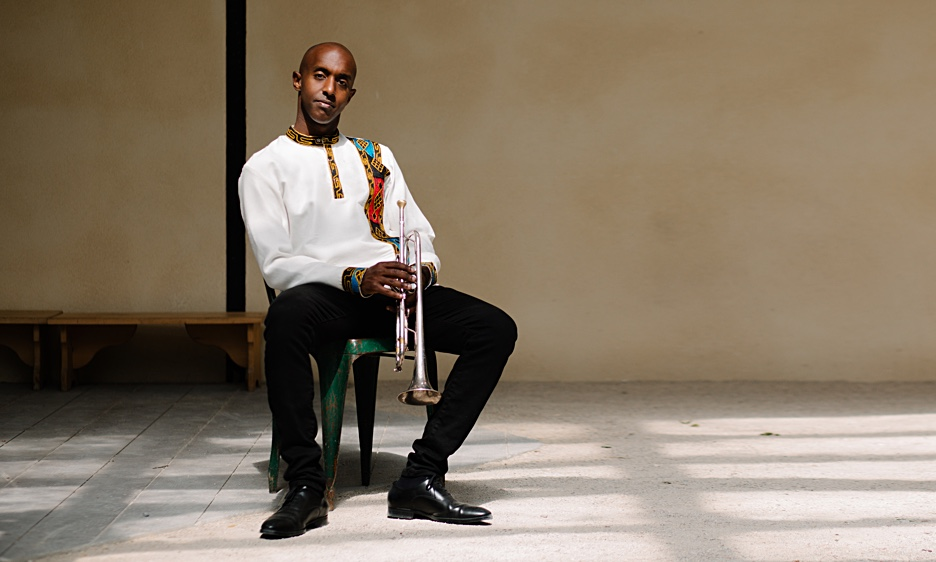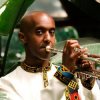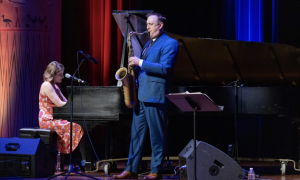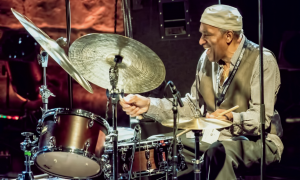Home » Jazz Articles » Catching Up With » Hermon Mehari: American Jazz, Eritrean Echoes
Hermon Mehari: American Jazz, Eritrean Echoes

Courtesy Maria Jarzyna
All About Jazz: Hermon, good morning. It's a pleasure to see you again.
Hermon Mehari:: Likewise, likewise.
AAJ: Okay. I know you are of Eritrean heritage, correct?
HM: Yes.
AAJ: Okay. So, tell me a little bit about your background, please.
HM: Sure. I was born in Dallas to Eritrean parents. My mom and dad were refugees from Eritrea. At the time there was a war with Ethiopia and Eritrea was fighting for its independence. My parents had met at a refugee camp in Italy and then made it to the States and I was born in the States. And after about five years, we moved to Missouri. I grew up close to Kansas City—Jefferson City. And, yeah, essentially just like a broad general statement, I grew up most of my life in Missouri and ended up going to school at the University of Missouri-Kansas City, Conservatory of Music there, studying trumpet.
AAJ: How old were you when you started trumpet?
HM: I started in middle school, like at seventh grade. So whatever age that is, like 13 or 12 years old.
AAJ: And when did you decide that music was going to be your professional life?
HM: It's funny. So, I started playing trumpet and then one year after I took a jazz improvisation course at my school, like a summer thing, and I decided, "Okay. I'm going to listen to... " if I'm going to do improvisation or try this, I should listen to some jazz. And I went to the record store and I went to the jazz section and I said, "Okay, I know

Miles Davis
trumpet1926 - 1991
AAJ: Sure. I know you compose and perform. Do you bring Eritrean music and instruments into your performances?
HM: So, it's funny that, the thing about Eritrean music is I grew up listening to it with my parents and going to Eritrean community parties and family events. I didn't listen on my own time. I was listening to other music. I mean, I was into mostly mainstream music at one point, and then when I got into jazz, I only listened to jazz. Pretty much like I shut everything out through college, until the end of college. And then I kind of started going back to the other music that I neglected and didn't listen to for a while. And in terms of Eritrean music, I only recently,—actually, it was during the pandemic in 2020, during my second album as a leader, where I had introduced this Eritrean music into my music with one song in particular called "Eritrea." And I had decided in this moment of reflection time, I was in the middle of the countryside in France for about three months. And so it was really a reflective time, and I was thinking about my past, my parents, my heritage, all this stuff. And I found it funny as I had never ever incorporated this music as part of my history, part of my childhood, as well. And so I went deep into it as I never even studied this music, as a learned musician who knows theory and all this stuff. So I went deep and I studied the history of it, I transcribed a bunch of music and better understood the roles of all the instruments. And then I composed and incorporated it. Then my latest album is Asmara, which is completely dedicated to this music—mixing it with jazz, that is.
AAJ: What are some of the characteristics of Eritrean music?
HM: I can loosely say that for instance, harmonically, it's very simple. It tends to be major usually and use mostly pentatonics. Rhythmically, it's interesting, it's got this almost triplety thing that is trance like. And it's mostly danceable tempos, 'cause it's mostly meant to be danced to. Form-wise, it can be all over the place. And often, for instance, it's very... Often, it's not instrumental, it's usually vocal. And there are horns that are used in the music, generally, and they act usually as responses to the vocal parts. And then one of the big things that you'll always almost hear is an instrument called the krar, which is a four-string instrument.
AAJ: I know you do a fair amount of touring outside of the United States. How did that come about? Is that intentional or do you find that there's just more work outside of the US, France, and other places, China, where you perform?
HM: Well, I've been touring Europe since 2010. I should say, actually, I've been playing in Europe since 2010. I've been, I guess you don't know, I live in Paris. So I'm based in Paris as of the end of 2016. And, yeah, I had started having opportunities in Europe and I decided, well, this is where all, at least most of the American musicians who are making a living performing are doing it in Europe, whether they live in Europe or not. So I said, I might as well go and do it from here and open more doors. There are a lot of opportunities to perform all over Europe. And I do of course, as mentioned, go to Asia sometimes. And more recently I've been able to go to Africa, which is cool. But I go back and play the states all the time.
AAJ: What is the instrumentation of your group and do you use the same musicians as you tour?
HM: It depends. So as a leader, 'cause I play as both as a leader and a sideman. And I'm called all the time as a sideman. So it's mostly me making time to set up my tours and, as a leader. And it depends on which project I'm touring. So if I'm touring, my most recent project, it's usually a quartet and it's going to be... I tour very often with

Peter Schlamb
vibraphoneAAJ: As an improviser, you have one of the most fascinating, intriguing, and involving improvisational styles that I've ever encountered.
HM: Thank you.
AAJ: I remember the first time I heard you play, I almost keeled over, and heads were turning. What drives that style that you have? It is so unique. It's almost indescribable. It has certain jazz vocabulary yes, but everything is surprising. there's always something around the corner. Tell me a little bit about how you approach that.
HM: Yeah. Thank you. I think it's very important to be, what's the word? Grounded in the tradition. And for me, all the greatest innovators that I look up to, have looked up to, were all steeped in the tradition. And so... And one of my favorite saxophonists said it the best; he says the tradition was, is to innovate as well. So if you think about people like

John Coltrane
saxophone1926 - 1967

Clifford Brown
trumpetb.1930

Charlie Parker
saxophone, alto1920 - 1955

Woody Shaw
trumpet1944 - 1989
AAJ: What equipment do you use?
HM: So I'm playing on a Bach Strad. But it's from the late '70s. And then I'm playing on an AR Resonance mouthpiece.
AAJ: That's great.
HM: I'm loving it.
AAJ: How many albums have you done as a leader?
HM: As a leader, I've done three as a leader and then four as a co-leader. And then I don't know how many, I have no idea how many as a sideman.
AAJ: I know you are personally invested in education and continuing to spread the word. I know you're really busy with the touring, but how do you do the education thing into your busy, busy schedule?
HM: I essentially do it in two major ways, I would say. One is that, with touring, I try to set up master classes that are possible, because then I'm at a new place and I can kind of reach people there and that way. I even did a few master classes the last two days in the south Paris. One on trumpet, one on jazz in general, improvisation rather. And I also have in the past done some online. Some, I've set up master classes online, people can kind of tune into. I haven't done it in a while. I would like to do it again, but I always like to do it very structured. I usually really think it out and have really clear ideas I want to express, really thought-out plan on how I express it as well. And then I do give lessons, but not, the students I have, because my schedule is crazy, are either once a month or twice a month basis as needed. My ultimate goal when teaching students is mostly, on the individual level, is mostly teaching them to teach themselves, making them independent.
AAJ: Do you still have the radio show?
HM: Yeah, I have a radio show on, KCUR 89.3. It's the NPR affiliate in Kansas City. And the show is called "The Session."
AAJ: And that's available over the internet worldwide, I would assume?
HM: Yeah, but only as a radio show, meaning that only when it's live. And that's Saturdays at 7:00 Central Time. So it's super late in Paris. And Europe.
AAJ: I know that you're going to be in China this coming year in a few months. Have you performed in China before?
HM: I've never performed in China. I've performed in Japan a few times, but never in China. This is my first time in China.
AAJ: Excellent. What kind of projects do you have coming down the pipe or that you envision?
HM: Well, right now I'm currently working on the music for two different albums of my own. One, which I can't say specifically anything about right now at this point. One, which I'd like to release at the first half of 2024, and one I'd like to release at some point, 2025, 2026. Then there's another band I have as a co-leader called NO(w) Beauty, it's based in France. And we released an album last year to a lot of success. And we're having a lot of success in France. We're winning awards and then we're getting lots of things written up about us. And so we are working on new music for another album already. So I've got a few albums that I'm working on musically.
AAJ:

Wynton Marsalis
trumpetb.1961

Terence Blanchard
trumpetb.1962

Wayne Shorter
saxophone1933 - 2023
HM: I have on several occasions. It's funny you ask that. There was a time about six, seven years ago, I started writing an opera, I kind of put it aside. And then there's a musician I collaborate with here who wanted to write an opera as well, recently. And so we've kind of been trying to put together the steps to do that. But I still, in my head, want to do that opera that I started a while ago. It's because I actually love opera, just like pure opera. I love the classics, especially like Verdi and Puccini. I like contemporary opera as well, but I really love the Italian classical operas.
AAJ: The reason I ask that, is that I can tell that that kind of project is in you. I know... There are folks that I can tell. I could never do something like that, but you could easily. You've got the chops to do it. Well, Hermon, this has been really, really awesome. Thank you so much!
HM: With pleasure.
Tags
Comments
PREVIOUS / NEXT
Support All About Jazz
 All About Jazz has been a pillar of jazz since 1995, championing it as an art form and, more importantly, supporting the musicians who make it. Our enduring commitment has made "AAJ" one of the most culturally important websites of its kind, read by hundreds of thousands of fans, musicians and industry figures every month.
All About Jazz has been a pillar of jazz since 1995, championing it as an art form and, more importantly, supporting the musicians who make it. Our enduring commitment has made "AAJ" one of the most culturally important websites of its kind, read by hundreds of thousands of fans, musicians and industry figures every month.






 Buy Now
Buy Now























